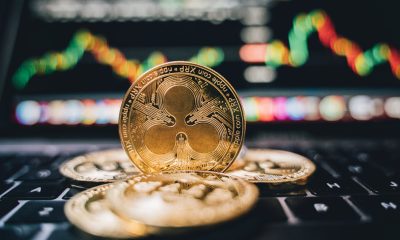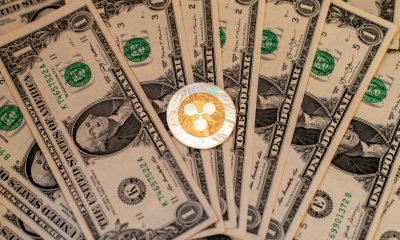Crypto
Crypto ETFs for XRP, Solana & Litecoin: A Game-Changer or Risky Bet?
The rise of cryptocurrency ETFs for XRP, Solana, and Litecoin offers new investment opportunities but comes with risks. ETFs provide safer, regulated exposure, boosting institutional confidence and liquidity. However, regulatory uncertainty and market volatility pose challenges. Success depends on approval and investor demand, making these ETFs a potential game-changer yet a double-edged sword.

With the growing popularity of cryptocurrencies, investors worldwide are faced with the question of how to diversify their portfolio. The recent discussion about exchange-traded funds (ETFs) for cryptocurrencies such as XRP, Solana and Litecoin offers new perspectives, but also risks. In this article, we analyze the potential opportunities and challenges that these financial instruments could bring.
Background on cryptocurrency ETFs
ETFs have established themselves as a popular investment strategy because they allow investors to invest in a diversified basket of assets without having to directly purchase those assets.
This structure reduces the direct risks of individual investments while providing market participation without the need to worry about custody of the cryptocurrencies themselves. The idea of offering ETFs for cryptocurrencies such as XRP, Solana and Litecoin reflects this approach.
The main developments in the ETF sector
In recent months, various companies have filed applications for ETFs on less established cryptocurrencies with the US Securities and Exchange Commission (SEC).
These requests demonstrate the increased interest of financial markets to further explore the world of cryptocurrencies. For XRP, Solana and Litecoin in particular, the approval of an ETF could facilitate access for institutional investors and increase adoption in the wider market.
Opportunities offered by cryptocurrency ETFs
The launch of ETFs for these cryptocurrencies could bring several benefits. First, it would be a significant step towards mainstream adoption, as products like ETFs are often seen as safer and regulated forms of investment. This could boost the confidence of institutional investors who are often hesitant to invest in unregulated markets.
Additionally, ETFs could increase liquidity for XRP, Solana, and Litecoin. More liquidity generally means that these coins are subject to more stable price fluctuations, which in turn could increase confidence among small investors. Also, simplifying the investment process through an ETF makes these assets accessible to a larger number of investors.
Risks and uncertainties surrounding the development
Nevertheless, these potential developments are not without risks. A key risk remains regulatory uncertainty. The SEC has so far taken a conservative stance towards approving new and innovative financial products on less established cryptocurrencies. Approving such an ETF could send contradictory signals and challenge the evolution of the market structure.
Another risk is the potential market volatility that could be associated with the introduction of new financial products. Greater market participation by institutional investors could lead to a short-term price increase, followed by a possible market adjustment, which could lead to uncertainty among individual investors.
Conclusion: A double-edged sword for the crypto market?
While the prospect of XRP, Solana and Litecoin ETFs promises numerous potential benefits, carefully weighing the risks is crucial. The success of these financial products depends not only on regulatory acceptance, but also on how well they meet investors’ needs and expectations.
For investors who believe in the long-term potential of cryptocurrencies, ETFs could represent a convenient way to benefit from their growth. Nevertheless, it remains important to closely monitor developments in this space and make informed investment decisions.
__
(Featured image by Tima Miroshnichenko via Pexels)
DISCLAIMER: This article was written by a third party contributor and does not reflect the opinion of Born2Invest, its management, staff or its associates. Please review our disclaimer for more information.
This article may include forward-looking statements. These forward-looking statements generally are identified by the words “believe,” “project,” “estimate,” “become,” “plan,” “will,” and similar expressions. These forward-looking statements involve known and unknown risks as well as uncertainties, including those discussed in the following cautionary statements and elsewhere in this article and on this site. Although the Company may believe that its expectations are based on reasonable assumptions, the actual results that the Company may achieve may differ materially from any forward-looking statements, which reflect the opinions of the management of the Company only as of the date hereof. Additionally, please make sure to read these important disclosures.
First published in BLCOK-BUILDERS.DE. A third-party contributor translated and adapted the article from the original. In case of discrepancy, the original will prevail.
Although we made reasonable efforts to provide accurate translations, some parts may be incorrect. Born2Invest assumes no responsibility for errors, omissions or ambiguities in the translations provided on this website. Any person or entity relying on translated content does so at their own risk. Born2Invest is not responsible for losses caused by such reliance on the accuracy or reliability of translated information. If you wish to report an error or inaccuracy in the translation, we encourage you to contact us

-

 Cannabis7 days ago
Cannabis7 days agoCannabis and the Aging Brain: New Research Challenges Old Assumptions
-

 Africa2 weeks ago
Africa2 weeks agoUnemployment in Moroco Falls in 2025, but Underemployment and Youth Joblessness Rise
-

 Crowdfunding5 days ago
Crowdfunding5 days agoAWOL Vision’s Aetherion Projectors Raise Millions on Kickstarter
-

 Fintech2 weeks ago
Fintech2 weeks agoFintower Secures €1.5M Seed Funding to Transform Financial Planning























